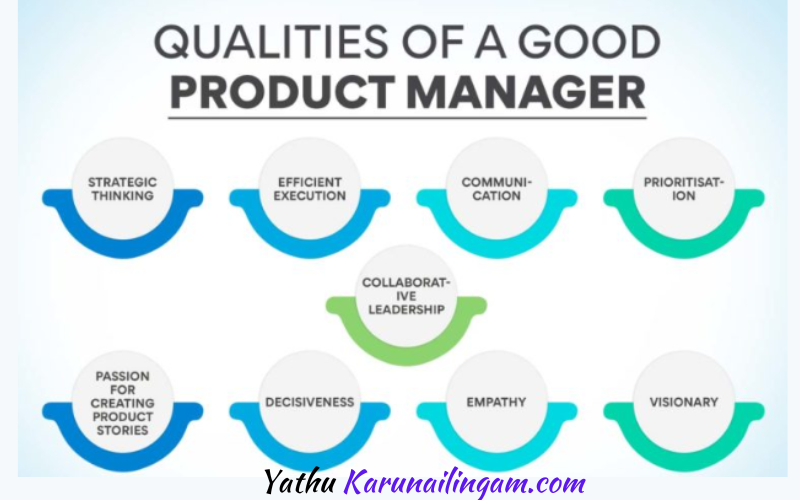- September 22, 2024
- by uyuwh
- Blog
- 0 Comments
Product management is a fascinating field. Many people find this dynamic field exciting because it combines creativity and analytical thinking. Product managers are in high demand as organizations try to create innovative products that satisfy customer needs. What does it take to be a product manager?
A product manager has many roles to play. From collaborating with other teams to understanding market trends, they wear many hats. Knowing what to study to become a product manager will help you on this rewarding career path. Yathu Karunailingam is here to tell you everything you need about how to become a successful product manger in 2024.
Table of Contents
What to Study to Become a Product Manager? Required Skills
A successful product manager is a combination of analytical and interpersonal abilities. It is important to have a critical mind, which allows them to identify market needs and find viable solutions.
Communication plays a pivotal role too. Product managers need to communicate complex ideas to a wide range of stakeholders, including engineers and marketing teams.
Adaptability is also key to the constantly changing tech landscape. Users’ feedback and market trends should be used to adjust their strategies.
Strong organizational skills allow you to manage multiple projects at once without losing track of the details. Data literacy also allows them to make better decisions based on metrics, rather than just intuition.
Empathy is a skill that stands out. Understanding the pain points of customers helps create products that are in tune with their needs.
Education of a Product Manager
The educational background of a product manager can be very diverse, but certain fields provide a good foundation. Many PMs with successful careers have backgrounds in engineering, business or computer science. They are equipped with the critical thinking and analytical abilities that are necessary for this role.
Marketing courses are also important. When developing products, it is important to understand market dynamics and consumer behavior.
A product manager can also benefit from a good understanding of design principles, as it will help them to better work with the development team. A better understanding of UX/UI design can improve communication between stakeholders.
In this field, formal education is very important. However, experience in the real world often has more weight. A product manager’s ability to navigate complex challenges in any organization is shaped by a blend of academic and practical knowledge.
Popular Degrees and Certifications for Product Managers
Aspiring product manager often look for degrees and certifications to enhance their skills. A bachelor’s degree in Business Administration, Marketing or Business Administration is a good foundation. These programs include topics such as market analysis, consumer behaviour, and strategic planning.
Many professionals pursue an MBA that focuses on Product Management. This advanced degree offers deeper insight into business strategy, leadership and operations management.
The certifications of candidates can also set them apart. Agile methodologies enthusiasts will find programs like Agile Certified Practitioner (PMI ACP) or Certified Scrum Master CSM invaluable.
A wide range of certificates in Product Management from well-respected institutions also provide targeted information. Individuals who want to improve their skills often choose courses from General Assembly and Pragmatic Institute.
Workshops and online courses are great ways to keep your skills current in this field that is constantly changing. As a product manager, you must adapt to the latest trends in order to be successful.

The Importance of Internships and Real-World Experience
The internship is a vital part of the path to becoming a Product Manager. Internships provide practical experience that allows you to put your theoretical knowledge into practice.
You will learn the intricacies of product management by working with professionals who are experienced. You will learn how to work in a team and how decisions are taken at each stage of the product development process.
Real-world experiences help bridge the gaps left by classroom learning. This experience improves your ability to solve problems and sharpens your critical thinking. These experiences cultivate adaptability, which is a key trait for any successful Product Manager.
Internships are also a great way to expand your professional network. The connections you make with peers and mentors can open up doors to future opportunities in the industry. They are invaluable for your career advancement.
These experiences will help you to refine your understanding of market dynamics and user needs, laying a solid foundation for a future career as a product manager.
Role of Product Managers in an Organization – Learn With YathuKarunailingam
Career Advancement and Networking Opportunities
As a product manager, networking is crucial to your career advancement. Making strong connections opens doors to new insights and opportunities.
It is important to engage with professionals in the industry through webinars and conferences. These events provide not only information but also an opportunity to build relationships which may lead to mentorship or job referrals.
LinkedIn is a great way to maintain these connections. By regularly sharing insights or comments on posts, you will be visible to your network.
Joining product-management communities will allow you to share ideas and experiences with others facing similar challenges. This type of support can be vital when you are navigating a career change or trying out new opportunities.
Informational interviews with people you know can help you gain a deeper understanding of the companies and roles that interest your interests, and refine your career path.
How do I become a product manager?
What to study to become a product manager? To become a product manager, you need a combination of education, work experience and interpersonal skills. Begin by gaining a solid foundation in business and technology. This academic background is the foundation for understanding market dynamics.
Immerse yourself in your field. You should look for internships or roles at entry-level that will allow you to work with teams from different departments. These experiences can provide insight into product development and customer needs.
Connect with professionals at industry events or in online forums. Mentors can provide valuable advice on how to navigate your career.
Consider getting certifications in product management methods like Agile or Scrum. These credentials will enhance your resume, and show your commitment to professional development.
Stay up-to-date on the latest trends and best practices in product management by attending workshops, webinars and reading industry publications.
Salary of Product Managers in Canada – Learn with YathuKarunailingam
What are the Courses I Should Take to Become a Product Manager?
Consider taking courses to develop essential skills. Start by learning the basics of business. Marketing and finance courses can give you a better understanding of market dynamics and budgeting.
Explore technology-related topics. Understanding data analytics or software development processes is essential for collaboration with engineering teams.
Communication is also important. You should also look for classes to improve your negotiation and presentation skills. You will be able to communicate your ideas more clearly with stakeholders.
Project management courses will also give you the tools necessary to manage timelines and resources efficiently.
Don’t forget about user experience (UX) design principles. You can create more customer-centric products if you have a solid understanding of UX.
Consider certifications like Certified Scrum Product Owner (CSPO). It provides practical knowledge that is directly applicable in the field and boosts credibility among peers.
Finding the Right Path to Become a Product Manager
It is a thrilling journey to become a product manager. It takes dedication and a thorough understanding of the market as well as your own strengths.
Explore different educational paths that are aligned with your passions. To build a solid base, consider degrees in technology, business, or design. Certifications provide you with specialized knowledge and can help set you apart.
Internships provide valuable real-world experience. Internships can provide valuable insights into team dynamics, project management and more. They also enhance your resume.
The importance of networking is also important. Connect with professionals in the industry to get advice and learn about job opportunities.
Keep your eyes open and be flexible as the landscape changes. You will achieve success in the dynamic field if you continue to learn. It’s your unique path that makes it so special. So embrace it!
FAQs
What is product Management?
The product management process involves the creation of a new product, from conception to launch. This includes conducting market research, defining the requirements and working with different teams to create a successful product.
Do I have to hold a certain degree in order to be a product manager?
Successful product managers often have degrees in business administration, computer science, or engineering. Focus should be placed on the skills, not just formal education.
How can I move from another career into product management?
Yes! Yes! Transferable skills like strategic thinking and communication can be valuable assets.
What is the importance of experience in tech companies to aspiring PMs?
Experience in tech environments will definitely help future PMs better understand the dynamics of their industry. It’s not necessary. Other roles that require skills can be useful.
What certifications do I need to consider if this is a career I am serious about?
Credibility and knowledge of agile methodologies can be enhanced by obtaining certifications such as PMI’s Agile Certified practitioner (PMI ACP) or Certified Scrum Product Owner.
Do internships help you become a PM or are they not necessary?
Although internships aren’t required, they can enhance your resume and help you develop the skills necessary for success.
How can a Product Manager begin to network?
Attending industry meetups or joining professional groups on LinkedIn can be a great way to connect with professionals who may offer advice or future job opportunities.





